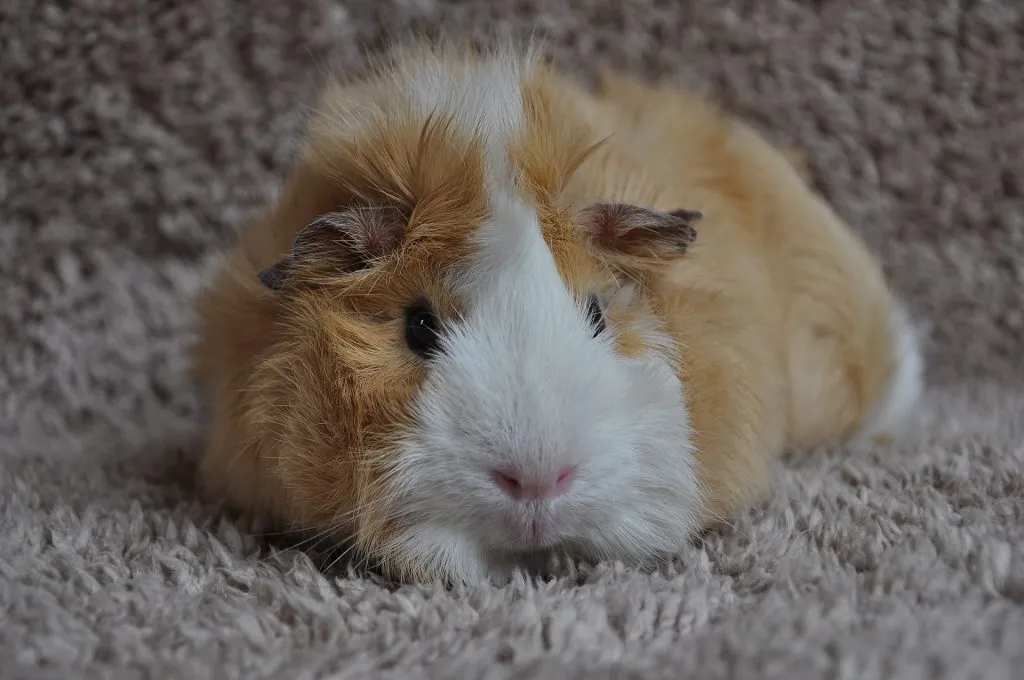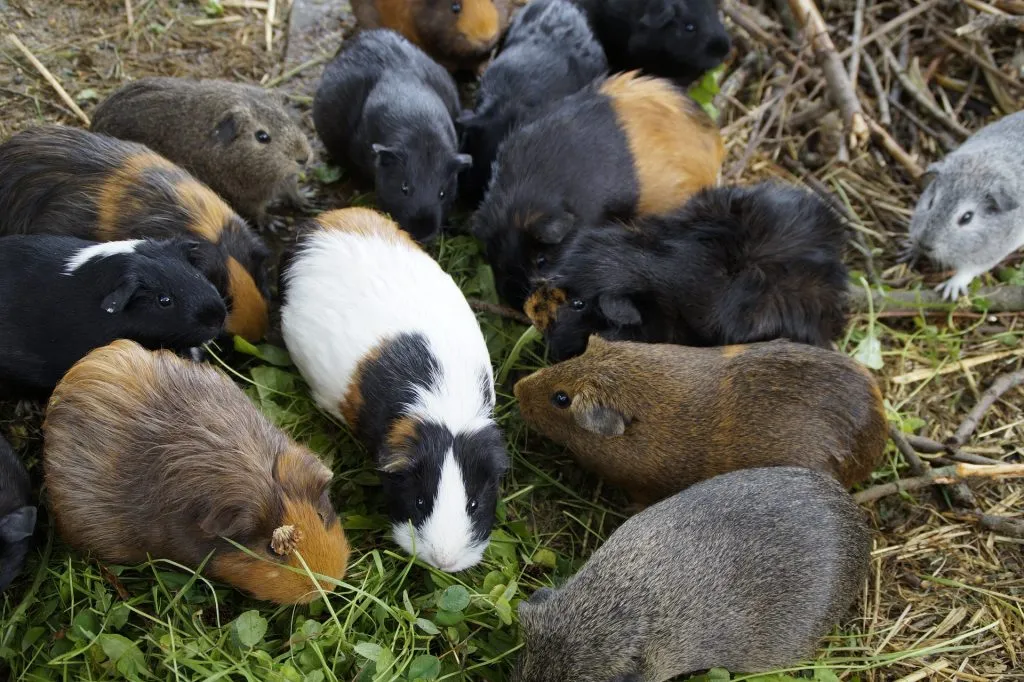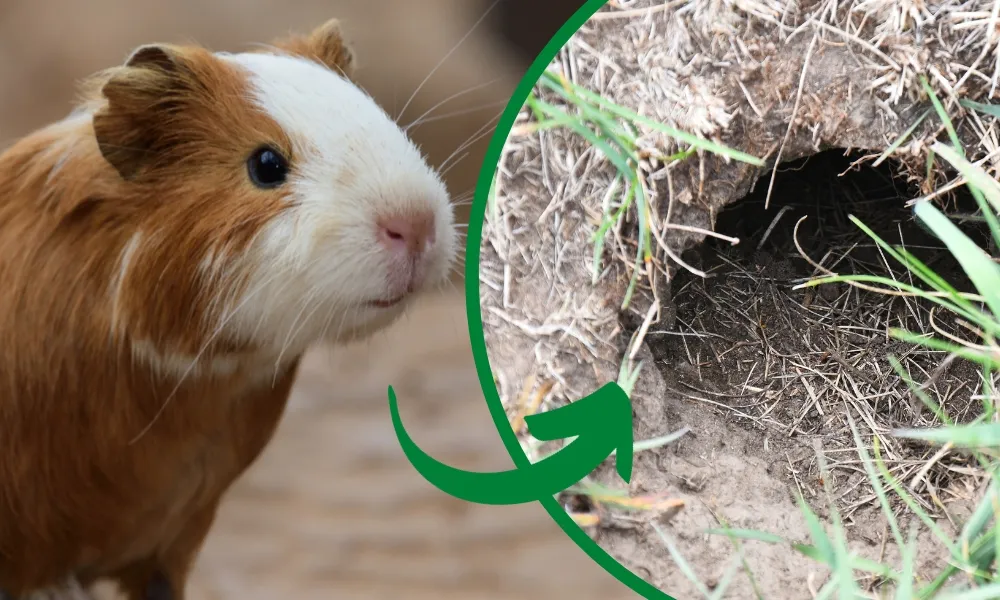It’s not surprising that guinea pigs can display interesting behaviors. For example, they squeak to express emotions or even groom themselves to stay clean.
And one interesting question you may have is – Do guinea pigs burrow in the ground?
No, guinea pigs normally do not burrow in the ground. This is because they don’t have the physical capability.
Compared to other rodents, guinea pigs have weak paws that make digging in the ground impossible. While they can’t bore a hole in the ground, these small pets find it easy to hide in one.
Just because guinea pigs don’t burrow in the ground doesn’t mean they don’t burrow in other places. You may want to know exactly why they exhibit this strange behavior.
Let’s explore the possible reasons and other interesting details about guinea pigs’ digging habits!
Table of Contents
Why Do Guinea Pigs Burrow?
Even though guinea pigs burrow for several reasons, we’ll be discussing the most common 5 of them.
1. It is a Natural Instinct
Being prey animals, it is natural for guinea pigs to hide in burrows, especially when they’re afraid. They display this behavior to protect themselves and feel safe when they sense danger in their habitat.
Pet guinea pigs are usually safer because they live in enclosures compared to those in the wild.
But since the behavior is part of their survival instinct, the domestic cavies also dig holes and hide in them.
2. Burrowing Helps Regulate Temperature

When the temperature is extreme for the guinea pigs, they tend to burrow to feel comfortable.
In cold temperatures, these pets will burrow in for warm spots around their environment. And when the weather is hot, they’ll look for a cool place to burrow to prevent heatstroke.
Burrowing allows guinea pigs to adapt to changes in weather, reducing their chances of untimely death.
3. Burrowing is a Nesting Behavior
Pregnant guinea pigs, in particular, dig holes in items to create the perfect place for giving birth. When a guinea pig is pregnant, she chooses a comfortable place to give birth to her babies.
This behavior, which is common among animals, is known as nesting. Female guinea pigs raise their babies in these places and keep them safe, cool, and comfortable.
In the wild, mother guinea pigs go into a burrow that other animals dig. But in captivity, guinea pigs burrow into their bedding or other materials as the delivery day draws near.
4. They Burrow Out of Curiosity
Here’s one thing you need to know about guinea pigs – they are smart and curious animals. They’re always ready to explore their environment, especially when you introduce something new.
One of the ways they do this is by burrowing to sniff strange scents, materials, or even food.
So don’t be surprised if your guinea pigs begin to dig into a new item in their surroundings.
5. It is a Form of Social Interaction

Burrowing is one of the social activities guinea pigs engage in to play with one another. Guinea pigs are friendly animals that move in groups because of their social nature.
Burrows are like a playground for guinea pigs to come together, play, and feel happy and safe. Additionally, burrowing improves their social interaction, reducing their chances of feeling lonely.
Keep in mind that keeping one guinea pig in the cage can cause boredom, resulting in aggressive behaviors.
How Do Guinea Pigs Burrow?
As we mentioned earlier, guinea pigs are not physically capable of burrowing into the ground or hard surfaces. Nevertheless, they can dig into soft surfaces, including bedding and hay.
Here are the simple ways guinea pigs burrow:
- They start by looking for a soft surface, such as hay, soft soil, or bedding materials.
- When they find the soft surface, the guinea pigs will begin to scratch the spot with their front paws and noses.
- Using their hind legs, the guinea pigs will begin to pass the dirt behind them until a hole is successfully created.
- When the hole is deep, the small pets will enter it and continue to burrow.
- Once the guinea pigs are satisfied with the burrow depth, they can sleep, hide, and play in it.
Do Domestic Guinea Pigs Still Need to Burrow?
Yes, domestic guinea pigs need to burrow because it is part of their instinct. Moreover, creating holes in materials is beneficial to these small animals in many ways.
In addition to offering safety and comfort to guinea pigs, burrows improve social interaction among guinea pigs.
It is also a form of playground and exercise for guinea pigs, which is important for their overall well-being.
Why Are My Guinea Pigs Burrowing Under the Fleece?
Guinea pigs burrow under the fleece for different reasons. However, a possible explanation is that they want to feel safe and warm.
For guinea pigs and other small animals, burrowing is a survival instinct. If the weather is too hot or cold, your pets may get under the fleece to regulate their temperature.
Stress and boredom can also cause a guinea pig to burrow continuously. Not only does continuous digging into the fleece make the cage messy, but it can pose a health hazard.
If your guinea pigs begin to chew on the fleece, they may be exposed to health risks.
Hence, always try to keep your small pets as comfortable and safe as possible.
Why Are My Guinea Pigs Burrowing Under the Hay?
If your guinea pigs are beginning to burrow under the hay, they’re likely hiding from potential threats.
There’s also a possibility that the weather conditions are not favorable for them, and hay offers comfort.
On the other hand, your pets may just want to explore their environment and play. Provide enough hay around their surroundings so that they can eat and burrow into them.
Always get rid of old and dirty hay to reduce the chances of sickness and disease.
Also, you can put fleece, boxes, and tunnels in their cages so that they can burrow into them.
What is a Guinea Pig Burrow Box?
A guinea pig burrow box is a toy that provides the best spot for the pets to burrow, hide, and feel cozy.
The box usually contains soft materials, including hay, wood shavings, or tiny paper pieces.
Apart from keeping the guinea pigs physically alert, the burrow box stimulates them mentally. Additionally, the box offers privacy for guinea pigs, especially when they want to rest or sleep.
Burrow boxes come in different shapes and sizes, giving you the chance to choose the most preferable.
Keep these tips in mind when using a guinea pig burrow box:
- Consider choosing a box that gives your pets enough room to move around and play without hindrances.
- Make sure the box is strong enough to withstand the constant burrowing activities of your cavies to prevent accidents.
- Create a schedule for cleaning the burrow box to keep your guinea pigs free from illness.
- Keep the box in a cool, quiet area, safe from the reach of predators.
- Preferably, put toys in the burrow box to keep your guinea pig engaged and lively.
Final Thoughts
Guinea pigs burrow because it is a part of their survival instinct. They also exhibit this behavior out of curiosity, as a form of social interaction, and to regulate their temperature.
For pregnant guinea pigs, burrowing is a way to prepare for their babies’ arrival. Provide hiding places in your guinea pigs’ enclosure to prevent them from digging holes around.
Keep more than one guinea pig in the cage and provide lots of toys for them, including tunnels and chewable.
Always add plenty of fresh hay to your pets’ enclosures since they enjoy burrowing into them!
Stress and boredom are a few of the major reasons guinea pigs burrow consistently. If you notice signs of discomfort in your pets, consult your vet doctor.
Do you want to know the natural habitat of guinea pigs? Check out this article – What are Guinea Pigs Natural Habitats?
Sources:
Nesting Instinct – Wikiwand.com
